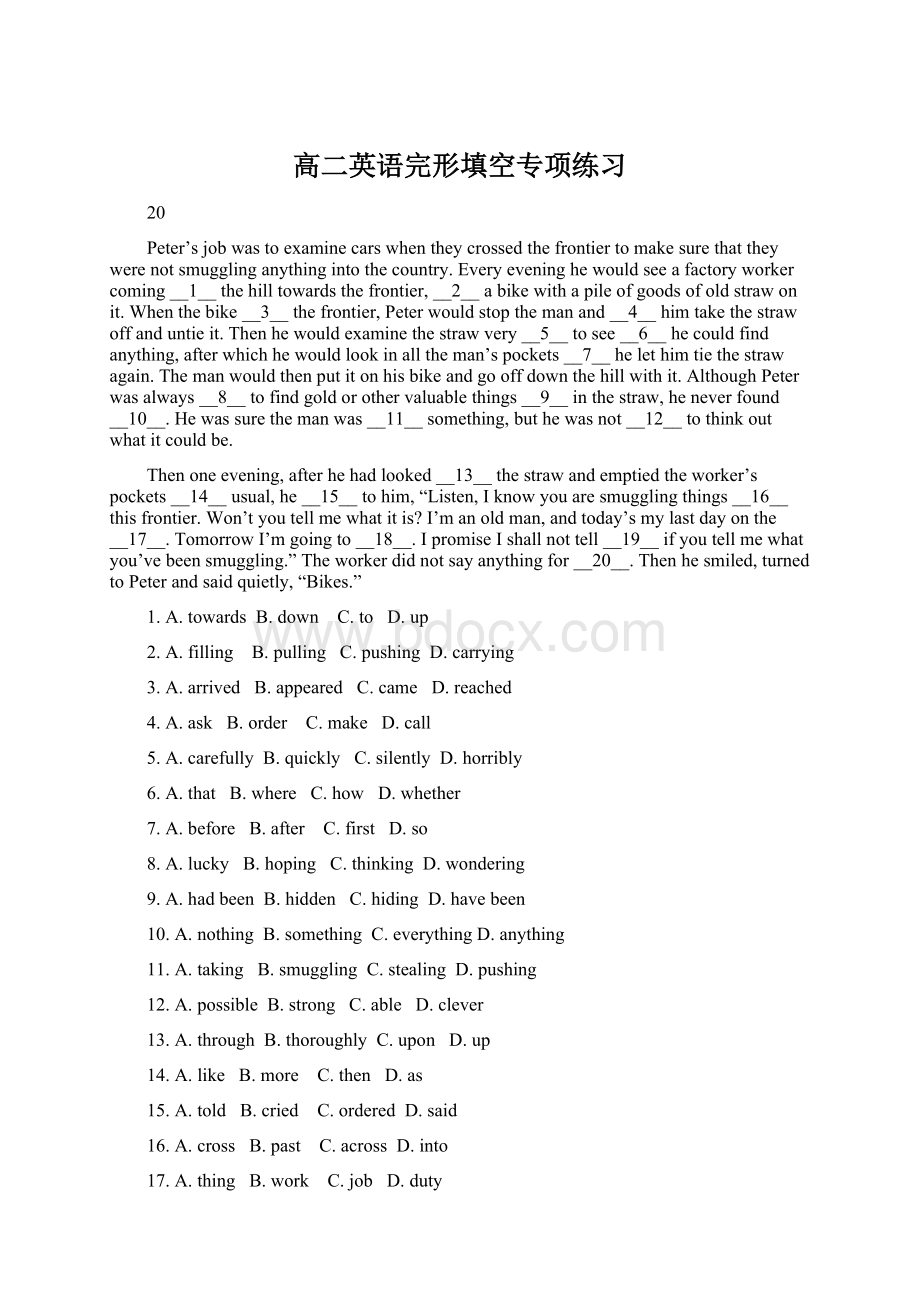高二英语完形填空专项练习Word文档格式.docx
《高二英语完形填空专项练习Word文档格式.docx》由会员分享,可在线阅读,更多相关《高二英语完形填空专项练习Word文档格式.docx(32页珍藏版)》请在冰豆网上搜索。

19.A.everyoneB.anyoneC.nooneD.someone
20.A.momentB.longtimeC.sometimeD.sometime
名师点评
这篇完型填空讲述了身为边防检查员的彼得明知一个工厂工人在走私货物却无法抓住对方的把柄。
在退休的前一天,彼得恳请其说出真相,结果令彼得恍然大悟。
答案简析
1.D。
根据下文这个工人越过边界后,走下山坡,所以到达边界之前应在朝山上走。
故选up。
2.C。
这名工人是在推着一辆装有稻草的自行车,故选动词pushing。
3.D。
这里表达的是到达边界之意arrive,come为不及物动词不可直接接thefrontier,故选reached。
4.C。
ask与order后接不定式的复合结构时,动词前应有to,make后接不定式的复合结构时,动词前to要省去。
根据下文应选make。
5.A。
彼得想发现这个工人在走私什么,所以应仔细地检查。
故选carefully。
6.D。
这里根据文意,应选择表示“是否”之意的whether作宾语从句的引导词。
7.A。
根据常理,彼得应先检查这个工人的口袋才能让他捆起稻草走人,故选before。
8.B.根据文意,彼得心中一直怀着查获走私物品的希望,故选hoping。
9.B。
这里things和hide之间是被动关系,现在分词hiding作定语时表示主动,所以应用过去分词hidden作后置定语表被动。
10.D。
本句中否定词never及文意决定了这里应选anything。
11.B。
四个选项从语法上讲都可以,只能从文意上进行区分,smuggling意为“走私”,是正确选项。
12.C。
固定结构beabletodosth.意为“能够干某事”。
13.A。
习惯用语lookthrough意为“彻底检查”。
14.D。
“asusual”为固定短语,意为“象平常一样”。
15.D。
tell,order后面应直接接人作宾语表示告诉某人和命令某人,而用say应为saytosb.故said为正确选项。
16.C.这里应选择一个介词构成介词短语在句中做状语。
介词past表“经过”;
across强调“从一边到另一边”;
而into表示“进入到……里面”。
根据文意across应为正确选项。
17.C。
“onthejob”为一常用短语。
意为“执行公务”。
18.C。
因为今天是彼得最后一天上班说明明天他就要退休retire。
19.B。
根据句中否定词not及文意应选anyone。
20.D。
本句说明这个工人回答彼得的问题之前沉默了一会儿。
A选项应用amoment;
C选项表示某一点时间;
D选项表示一段时间或一会儿,为正确选项。
21
AstrangethinghappenedtoHenryyesterday.Hewasonabusandto__1__.Sohestoodupandrangthebell.__2__makesurethedriverheardhim,herangittwice,butthebus__3__stop.Andtheconductorcameandshouted__4__him.
Theconductorwas__5__angryandspoke__6__fastthatHenrydidn’tunderstand__7__.ThebusstoppedatthenextbusandHenrygotoff.Ashegotoffheheardsomeonesaid,“Ithinkhe__8__aforeigner.”
WhenHenrygot__9__,hetoldhiswifeaboutit.
“__10__timesdidyouringthebell?
”hiswifeasked.
“Twice,”saidHenry.
“Well,that’sthesignal(信号)__11__thedriver__12__on.”Hiswifeexplained,“onlytheconductor__13__toringthebelltwice.That’swhytheconductor__14__soangry!
”
Henrynodded(点头).“__15__,”hesaid.
1.A.gotoffB.getsoffC.getoffD.geton
2.A.ToB.AtC.InD.with
3.A.doesn’tB.don’tC.didn’tD.wasn’t
4.A.inB.onC.ofD.at
5.A.soB.asC.atD.because
6.A.sothatB.thatC.soD.why
7.A.wordsB.awordC.speechD.song
8.A.wasB.isn’tC.isD.am
9.A.tohomeB.athomeC.inhomeD.home
10.A.HowmanyB.HowmuchC.HowlongD.How
11.A.toB.atC.onD.for
12.A.togoB.goC.wentonD.goes
13.A.allowedB.isallowedC.wasallowedD.allow
14.A.gotB.getsC.isgettingD.gotten
15.A.IseenB.IsawC.IseeD.Idid
本文讲述了一位外国人在乘车时遇到的麻烦。
当他准备下车时,因为着急按了两次车铃,结果引出一场误会,导致不能及时下车。
1.C。
从上下文意思可知他准备下车,故选getoff。
2.A。
他按两次电铃的目的是希望列车员能听见。
这里应用动词不定式表示目的,故选to。
3.C。
文章主要讲述过去发生的事情。
应用一般过去时,故选didn’t.
4.D。
shoutatsb意为“对某人大吵,大嚷”,故选at。
5.A。
由文章可知,列车员很生气,用副词so来修饰“angry”与下文that构成固定搭配,即so…that…,意思是“如此……以至……”。
6.C。
与上题同解。
7.B。
根据文意可知列车员的话乘客一句也没有听懂。
故选aword。
8.C。
因为是直接引语,所以这里用一般现在时。
故选is。
9.D。
got为不接物动词,可以直接接副词home,意为“到家”。
10.A。
分析四个选项,只有howmany后可接可数名词复数
11.D。
这里for表示一种限定,指专门给驾驶员的信号。
12.A。
根据文意可知按两次车铃是提醒司机继续前进的信号,动词不定式在此作后置定语,故选togo。
13.B。
列车员与allow之间构成被动关系,这里应用被动语态,故选isallowed。
14.A。
列车员生气的情况已发生,所以用一般过去时,故选got。
15.C。
根据文意,这位乘客知道列车员生气的原因之后,应说“Isee.”。
22
Allanwasworried.Thiswashisfirsttimetogotraveling1.Hedidn’tknowhowtofindhisseat,2hewenttotheairhostess(空姐)andasked,“Couldyouhelpme?
Ican’tfindmyseat.”Theairhostessshowed3theseatandtoldhim4andfastentheseatbelt(系好安全带).ShetoldAllannottomoveaboutwhentheplanewasgoingup.AndshealsosaidthatAllan’searsmightfeel5strange,buthedidn’tneedto6itbecausemanypeoplefelt7that.Whentheplanewasflyingveryhigh,Allancouldstandupandwalkaround.Hecould8readbooks,newspapersorseefilms.Theairhostesswould
__9__foodanddrinks.Allanwouldenjoytheflightand10soon.
1.A.byshipB.byairC.bycarD.bybus
2.A.yetB.orC.butD.so
3.A.himB.meC.herD.he
4.A.standupB.sleepC.tositdownD.sitdown
5.A.alittleB.littleC.abitofD.bit
6.AworryingB.beworriedC.worryaboutD.worry
7.A.inB.forC.asD.like
8.A.neitherB.eitherC.bothD.also
9.AholdB.takeC.bringD.carry
10.A.arrivehomeB.arrivetohomeC.gettohomeD.reachathome
本文讲述了Allan第一次乘飞机时的经历与感受。
1.B。
本文讲述了Allan第一次乘飞机时的情况,故选byair。
2.D。
根据文意,Allan因为找不到座位,所以他就去问空姐。
这里构成因果关系,应用so引导结果状语从句。
3.A。
Allan是男士,故选him充当show的宾语。
tellsb.todosth.意思是“叫某人干某事”。
故选tositdown。
alittle修饰形容词表示“有点……”。
6.C。
needto后面应接动词原形。
worry为不接物动词,不能直接接宾语。
故选worryabout。
7.D。
likethat意为“像那样”。
8.B。
固定结构either…or…,意为“或者……或者……”。
9.C。
根据文意,空姐拿来食物和饮料给乘客,故选bring。
10.A。
这里home是副词,其前面应用不接物动词,故选择arrivehome。
23
Whatisthebestwaytostudy?
Thisisaveryimportantquestion.SomeChinesestudentsoften1veryhard2longhours.Thisisa3habit(习惯),butitisnotabetterwaytostudy.Agoodstudentmust4enoughsleep,enoughfoodandenoughrest.Every5you6totakeawalkorplaybasketballorping-pongorsingasong.Whenyou7toyourstudies,you’llfindyourself8thanbeforeandyou’llleanmore.
Perhapswecan9thatlearningEnglishisliketakingChinesemedicine,wemeanthatlikeChinesemedicine,theeffects(效果)ofyourstudy10slowlybutsurely.LearneverydayandeffectswillcomejustlikeChinesemedicine.
1.A.playB.studyC.sleepD.think
2.A.atB.inC.forD.with
3.A.bestB.betterC.goodD.bad
4.A.haveB.doC.wantD.make
5.A.monthB.weekC.hourD.day
6.A.wantB.hopeC.needD.wish
7.A.beginB.returnC.goD.are
8.A.strongerB.weakerC.strongD.week
9.A.sayB.guessC.talkD.know
10.A.returnB.comeC.giveD.get
文章讲述了认真学习的同时,必须要注意劳逸结合。
这样才有好的学习效率。
下文指出这是一个好的学习习惯但不是一个好的学习方法,故选study。
介词for常与段时间连用,在句中作状语。
3.C。
与下半句形成转折关系,这里应选good,说明努力学习是一种好的习惯。
4.A。
一个会学习的学生必须有足够的睡眠。
have意为“拥有”,为正确选项。
5.D。
下文takeawalk,playbasketball都是些日常活动,故day为正确选项。
takeawalk,playbasketball这些活动很有必要在学习之余进行,故选need。
7.B。
根据文意,休息之后,应重新返回到学习上,而不是才开始学习,故选return。
8.A。
由句中的than可知应选比较级;
根据文意,锻炼身体后,身体应更加强壮,故选stronger。
9.A。
say强调说的内容;
guess表猜测;
talk指交谈;
know指知道。
这里强调说的内容,故选say。
10.B。
根据最后一句“effectswillcomejustlikeChinesemedicine”以及文意可知come为正确选项。
24
Mr.Greenwasillandwenttothehospital.Adoctor__1__andsaid,“Well,Mr.Green,youaregoingto__2__someinjections,andyou’llfeelmuchbetter.Anursewillcome__3__giveyouthefirstonethisevening,andthenyou’ll__4__getanotheronetomorrowevening.”__5__ayoungnursecametoMr.Green’sbedandsaidtohim,“Iamgoingtogiveyouyour__6__injectionnow,Mr.Green.Wheredoyouwantit?
Theoldmanwas__7__.Helookedatthenursefora__8__,thenhesaid,“__9__haseverletmechoosethatbefore.Areyoureallygoingtoletmechoosenow?
“Yes,Mr.Green,”thenurseanswered.Shewasinahurry.“Wheredoyouwantit?
“Well,then,”theoldmananswered__10__“Iwantitinyourleftarm,please.”
1.A.lookedforhimB.lookedhimover
C.lookedafterhimD.lookedhimup
2.A.getB.giveC.makeD.hold
3.A.soB.butC.orD.and
4.A.mustB.canC.hadbetterD.haveto
5.A.InthemorningB.Intheafternoon
C.IntheendD.Intheevening
6.A.firstB.oneC.twoD.second
7.A.confidentB.surprisedC.fullD.hungry
8.A.hourB.minutesC.yearD.moment
9.A.SomebodyB.AnybodyC.NobodyD.peop